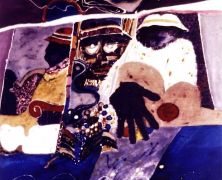Cotton was king, yet even cotton was a king dependent on the votes of markets and consumers thousands of miles removed. But living globally did not mean gracefully absorbing global meanings...
Portfolio: Batik Paintings
Inspired by Langston Hughes’ poem, “The Negro Speaks of Rivers,” Leo Twiggs sees waterways as the vessels of African American experience – ancient, past, and present. A great deal...
My Unexpected South & The Land of Cotton
Given my grandparents’ use of Yiddish and Romanian at home as well as newfound English, a mix of languages coursed through the rooms. The street out their window had the flavor of the...
Bitter in the Mouth
You mean what was it like to grow up looking Asian in the South, I would say back to them with the southern accent that had revealed to them the particulars of my biography. My tweaking of...
Another Dimension
Right after her mother’s death, when she and Jimmy were kids, their dad had dated somewhat indiscriminately. Therapists might have suggested he do things differently but he was a...
Goin’ Down South
Somehow, in their little boy minds, a place that spied on people couldn’t be real; spying happened only in the movies, not to real people. The specter of spying and deceit added to the...
Still on Assignment
During a winter evening of drinking with Faulkner at his Oxford home in 1959, the Nobel Prize-winning author told me he believed white students would peaceably accept desegregation of the...
I Speak Inglés
I had gotten my acceptance letter from State. And that’s where I wanted to go, So I was just like, [cheers] “Yes! Yes! Yes!” But the letter asked for a visa, a student...
Poems from Bellocq’s Ophelia
A very white-skinned black woman — mulatto, quadroon, or octoroon – she would have lived in one of the few “colored” brothels ...
Spring 2012
The American South has always been global, home to people from every continent, many of whom arrived from distant shores, some by choice, some by force. We recognize international influences in the food, music, dance, and traditions of the South. Yet people marked as different by race, ethnicity, or religion still find themselves bumping up against the dominant culture and struggling to cope with established norms of conformity and submission. The pieces in this issue—a kaleidoscope of fictional, autobiographical, poetic, and visual narratives—elaborate on this powerful dynamic of cultures within a larger culture navigating the tension between insider and outsider.
Special thanks to all who have made our website redesign and this edition of South Writ Large possible: Dean Cavalier Designs, Annunciation Interactive, Van’s Websites, Fiddler Studios, and the University of North Carolina at Chapel Hill Web Services.










